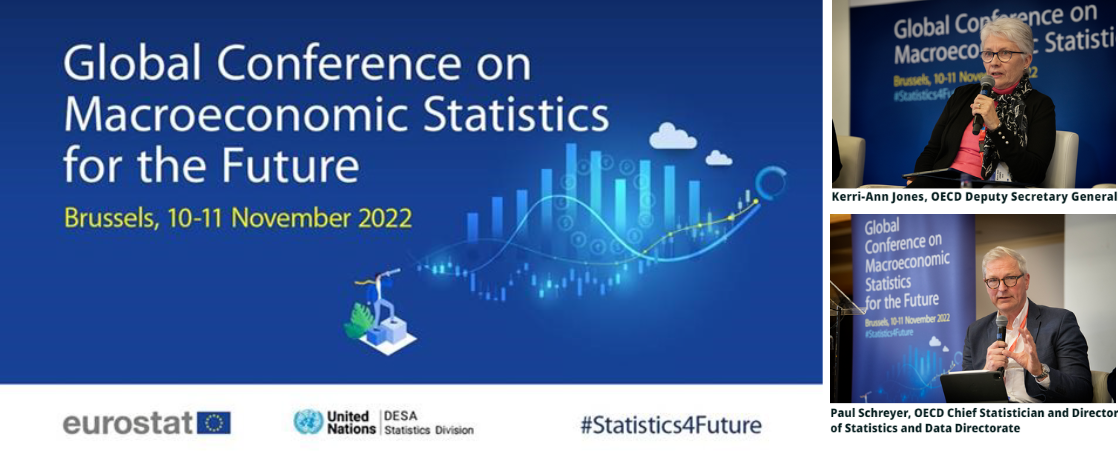Statistics and Data Directorate
Conference on Macroeconomic Statistics for the Future

On 10-11 November 2022, Eurostat and the United Nations Statistics Division (UNSD) organised a global conference on “Macroeconomic Statistics for the Future”at the Palais d’Egmont in Brussels. The conference was opened by Mariana Kotzeva, Director-General of Eurostat, and Stefan Schweinfest, Director of the UNSD.
The event brought together around 250 participants from more than 70 countries from around the world, including politicians, public officials working in policy development, national accounts compilers and academics. It was live-streamed for those who could not be come in person.
The opening panel, chaired by Mariana Kotzeva, consisted of Paolo Gentiloni, Commissioner for Economy at the European Commission; Kerri-Ann Jones, Deputy Secretary-General at the Organisation for Economic Co-operation and Development (OECD); Rebeca Grynspan, Secretary-General of the United Nations Conference on Trade and Development (UNCTAD) and Irene Tinagli, Member of the European Parliament and Chair of the Committee on Economic and Monetary Affairs. The panel discussion highlighted how official statistics, and in particular macro-economic statistics, support policymaking.
In the afternoon of the first day, Paul Schreyer, Chief Statistician of the OECD and Director of the Statistics and Data Directorate, chaired a session called ‘Beyond GDP’, which generated a lively debate and a number of follow-up questions from the audience.
The world statistical community is working on updating the 2008 System of National Accounts (2008 SNA), the global standards that set the rules for the calculation of GDP and other key macroeconomic indicators as well as the Balance of Payments Manual (BPM). This work focuses on giving visibility to the effects of digitalisation and globalisation on the economy, integrating elements of social well-being and environmental sustainability into national accounts and enhancing the communication of macroeconomic statistics to improve their accessibility and usability for all.
The discussions confirmed the crucial importance of the dialogue between users and producers to enhance the relevance of macroeconomic statistics. Panellists and participants supported the direction of the ongoing work on the update of the macroeconomic statistics standards. The work on wellbeing and sustainability, that recommends considering depletion of natural resources as a cost of production and valuing renewable natural resources in national accounts, will support analysis and policy decisions to promote sustainable growth. The discussion showcased a strong user interest in data on the digital transformation in economies, as well as clearly identifying globalisation effects in macroeconomic statistics. The SNA update is addressing key issues, such as how to account for data and free digital products and proposing ways to provide more insights on the activities of multinational enterprises.
The audience appreciated the transparency of the ongoing process and underlined the importance of testing the proposed solutions for smooth and timely implementation. Supporting developing countries in capacity building will be essential, and International organisations were called on to step up their efforts. The implementation of the revised standards after their adoption, expected in March 2025, relies on developing new data sources and methods. Two key aspects were highlighted: access for statisticians to privately-held data will be essential to fill current information gaps, and exchanging data and information across countries will be needed to tackle the statistical challenges from economic globalisation. The audience also appreciated the work of the UN network of Economic Statisticians, which strives to complement the standard macroeconomic framework with an all-encompassing “system of systems” that aims at integrating inclusive and sustainable wellbeing. Finally, the importance of cooperation with the academic community to broaden the work was underscored.
The conference served as a high-level platform for users and producers to discuss their needs and reflect on how the ongoing work on the System of National Accounts meets them.
Download
The full programme and presentations are available on the conference website: https://www.statistics4future.eu/.
Contact
For any question or comments, please contact contact@statistics4future.eu.
Related Documents